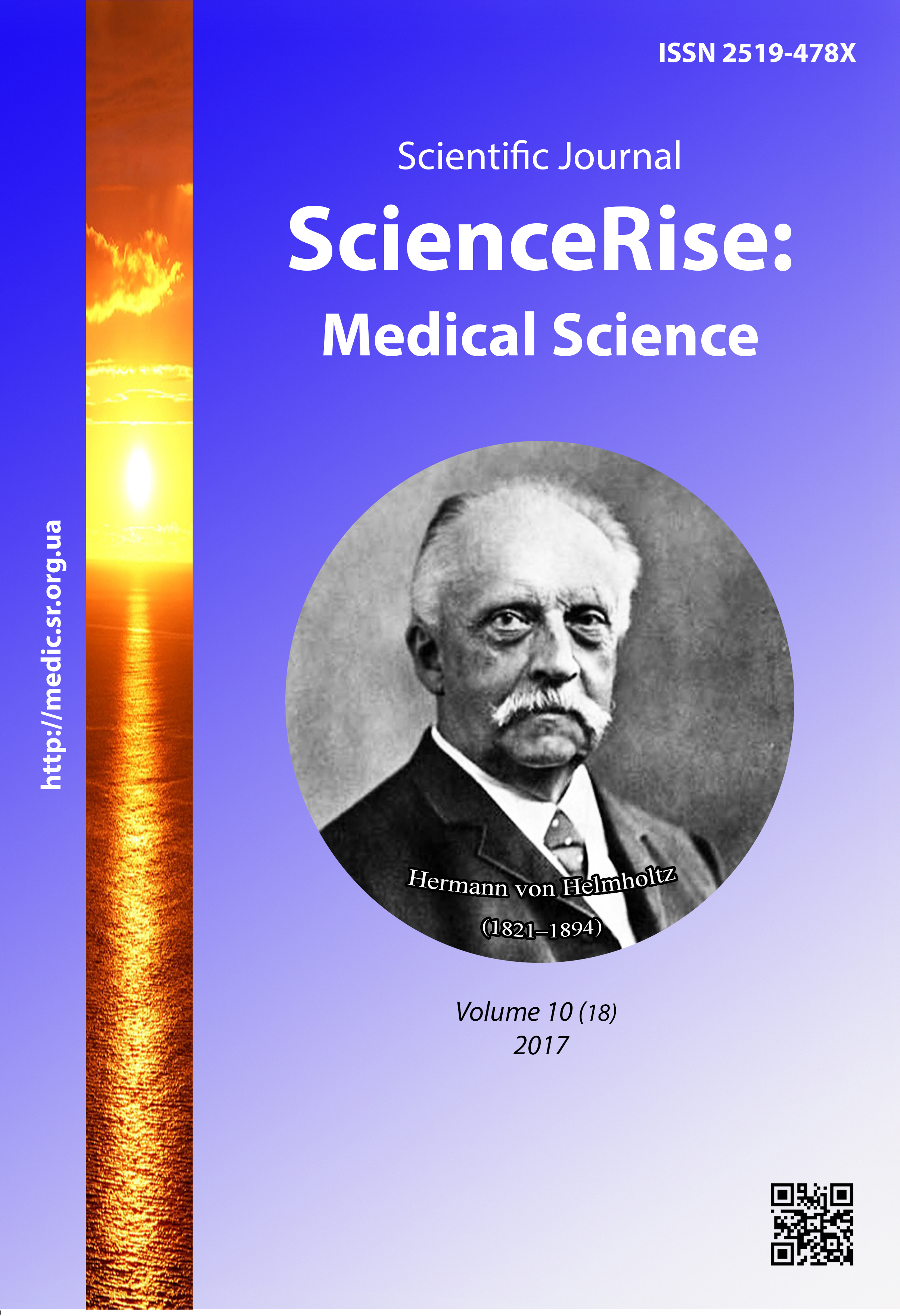Systematization of risk factors of maladjustment states formation in students under modern conditions
DOI:
https://doi.org/10.15587/2519-4798.2017.113511Keywords:
medical students, adaptation disorders, risk factors, psychosocial factors, personal featuresAbstract
Aim of the work: To systematize pathogenetically important factors of adaptation disorders in students of the medical university.
Materials and methods of research: the complex examination of 412 students of І–ІІІ years of Kharkov national medical university, 17–22 years old, was realized, observing principles of bioethics and deontology.
All examined persons were divided in three groups:1 group – 215 of students-dwellers of the Eastern Ukraine; 2 group – 87 students-dwellers of Lugansk and Donetsk regions, who entered Kharkov national medical university before the beginning of ATO; 3 group – 110 students-migrants from ATO zone.
Research methods: clinical-anamnestic, psychodiagnostic, statistical.
Results. The research results demonstrated that students-migrants express the higher level of adaptation disorders compared with ones of І and ІІ groups. Students relate to factors that influence adaptation complications: life stereotype change, difficult learning material, severe learning discipline, necessity to work out missed activities and lectures. The stress factors for students-migrants are a necessity to adapt in the new collective, abrupt change of the life stereotype, new social status - constrainedly migrated persons.
Expressed manifestations of anxiety and depression are typical for patients with adaptation disorders (in overwhelming majority students of ІІІ group).
It was established, that deviations of scales of depression, hypochondria, hysteria, psychopathy, psychasthenia are typical for personal profiles of women with maladjustment signs. Men with adaptation disorders most often demonstrate deviations of scales of hypochondria, depression, hypomania, schizophrenia.
Conclusions. Students relate to factors that influence adaptation complications: life stereotype change, difficult learning material, difficult terminology, necessity to work out missed activities and lectures. The risk factors of adaptation disorders formation for students-migrants are a necessity to adapt in the new collective, abrupt change of the life stereotype, new social status – CMP; high indices of anxiety and depression; prevalence of psychopathic, hysterical and depressive features
References
- Malakhov, P. S., Asieieva, Yu. O., Kharitonova, A. S. (2016). Problemnist adaptatsii studentiv-medykiv. Medychna psykholohiia, 2, 3–5.
- Gavenko, V. L., Gavenko, N. V., Boyko, V. V. (2010). Dezadaptivnye rasstroystva u studentov medikov. Novye podkhody k diagnostike, lecheniyu i reabilitatsii psikhicheskikh zabolevaniy. Kharkiv, 112–113.
- Kozhina, G. M., Markova, M. V., Grinevich, E. G., Zelens'ka, K. O. (2011). K probleme adaptatsionnogo sindroma studentov mladshikh kursov VUZov III–IV urovney akkreditatsii. Arkhіv psikhіtrіi, 17 (4 (67)), 32–35.
- Zelens'ka, K. O. (2011). Sravnitel'nyy analiz osobennostey adaptatsii k uchebnoy deyatel'nosti studentov pervokursnikov. Tavricheskiy zhurnal psikhiatrii, 15 (2 (52)), 22.
- Kіoseva, O. V. (2016). Psikhopatologicheskaya kharakteristika emotsional'noy sfery u studentov mladshikh kursov. Ukrainskyi visnyk psykhonevrolohii, 24 (1 (86)), 60–63.
- Kovalenko, M. V. (2014). Strukturnyi analiz perfektsionizmu u studentiv vyshchykh navchalnykh medychnykh zakladiv. Ukrainskyi visnyk psykhonevrolohii, 22 (3 (80)), 65–68.
- Pshuk, N. H., Slobodianiuk, D. P. (2015). Rol psykhosotsialnykh chynnykiv v genezi sotsialnoi dezadaptatsii u studentskoi molodi. Ukrainskyi visnyk psykhonevrolohii, 23 (2 (83)), 86–91.
- Chaban, O. S., Khaustova, O. O., Trachuk, L. Ye. (2016). Shliakhy pidvyshchennia efektyvnosti navchannia studentiv za spetsialnistiu «Medychna psykholohiia». Medychna psykholohiia, 11 (1), 3–8.
- Zorii, A. I. (2010). Vzaiemozviazok osobystisnykh rys studentiv-medykiv i pokaznykiv vehetatyvnoi nervovoi systemy pid chas skladannia ispytiv. Medychna psykholohiia, 5 (1), 15–18.
- Markova, M. V. (2010). Systema psykhohihiieny ta psykhoprofilaktyky porushennia funktsionuvannia studentskoi simi. Ukrainskyi visnyk psykhonevrolohii, 18 (3 (64)), 133.
- Korniienko, O. V. (2015). Indyvidualno-typolohichnyi (introvertovanyi) ta faktornyi analizy psykhosomatychnoho zdorovia studentok-divchat Kyivskoho natsionalnoho universtytetu imeni Tarasa Shevchenka. Humanitarnyi visnyk DVNZ "Pereiaslav-Khmelnytskyi derzhavnyi pedahohichnyi universytet imeni Hryhoriia Skovorody", 35, 144–151.
- Lobunets, H. Yu. (2012). Problema rozladiv psykhichnoi sfery studentiv, yaki maiut invalidnist. Medychna psykholohiia, 4, 48–50.
Downloads
Published
How to Cite
Issue
Section
License
Copyright (c) 2017 Maksim Khaustov

This work is licensed under a Creative Commons Attribution 4.0 International License.
Our journal abides by the Creative Commons CC BY copyright rights and permissions for open access journals.
Authors, who are published in this journal, agree to the following conditions:
1. The authors reserve the right to authorship of the work and pass the first publication right of this work to the journal under the terms of a Creative Commons CC BY, which allows others to freely distribute the published research with the obligatory reference to the authors of the original work and the first publication of the work in this journal.
2. The authors have the right to conclude separate supplement agreements that relate to non-exclusive work distribution in the form in which it has been published by the journal (for example, to upload the work to the online storage of the journal or publish it as part of a monograph), provided that the reference to the first publication of the work in this journal is included.









